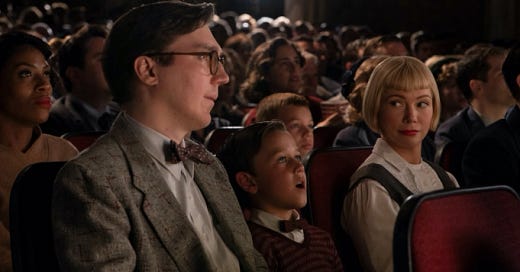I can’t tell you how many times I’ve listened to the life story of a creative or artist and how their beginnings were the reason they were able to do what they do.
Oftentimes it’s the specific set of parents they were given. For example, there’s the mom who was a pianist and, therefore, knew the in’s and out’s of getting the child set up for piano lessons along with being a heartfelt encourager; it’s not unexpected, then, for that same child to become an award-winning musician, if that’s their dream.
I’ve seen children born into homes with a strong desire to act, to dance, or to photograph, only to have placed before them just the right set of parental skills, household with resources, or connect with a neighbor or mentor. There are countless stories like this. You’re left feeling that none of this is simply a coincidence.
Such is the case with Steven Spielberg. His beginnings are told in his autobiographical film “The Fabelmans.”
The film is a deeply personal portrait of his childhood, including the memories of the forces and family that shaped his life and career. It’s a coming-of-age story about how he began to pursue his dreams, exploring love, artistic ambition, sacrifice, and the moments of discovery that allow us to see the truth about ourselves, and our parents, with clarity and compassion.
We see in the “The Fabelmans” Spielberg being quite the observant child. He was asked in a New York Times interview if the way he conveys a lot of emotional and psychological information in scenes was discovered by accident or instinct. “I think it was probably instinctively because as my wife always says, there are no accidents,” says Spielberg.
It’s a terrific example of how, from an early age, there was a combination of his curiosity and interests which seemed to match with just the right parents and mentors — and we are all beneficiaries of his works of art.
The below interview is probably best understood AFTER you watch the film. It doubly underlines not only the impact of supporters in his life but also how creating this latest film has impacted him.
From Time Magazine:
He’d spoken to his mother about it when she was still alive, unsure whether she’d want him to tell their family story in such a public way. “There’s a little bit of this story in all your films. But you’ve always felt safer using metaphor,” his mother said. “And I think you’re probably scared of the lived experience.” She told him if he thought he could make something he would be proud of, he should go ahead and make it.
And as Spielberg says, through making this film he realized a family burden he had been carrying for years and was able to “exorcise it from my own heart and soul.” He says the film was cathartic for him and helped him to process deeply held feelings about his childhood.
Inasmuch as the film is about Spielberg’s life, there is a universal truthfulness about this story (which is in every one of his films) that causes you to track to your own circumstances and history. In there is the art impact, for you.



